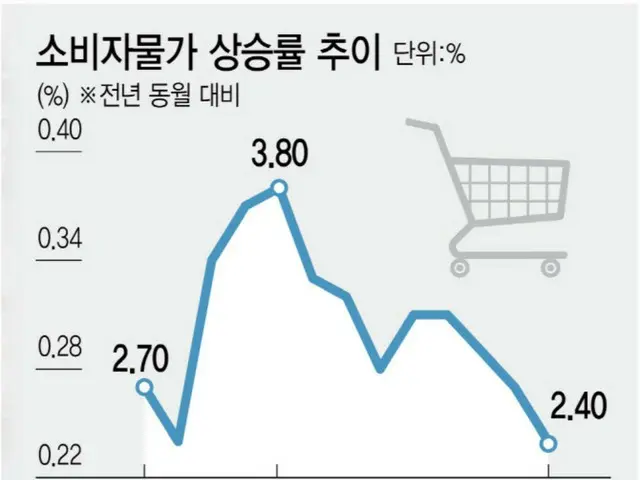The Bank of Korea said it could consider lowering interest rates if the inflation rate in the second half of the year shows a downward trend to the mid-2% range.
Last month's consumer price index was 113.84 (2020=100), up 2.4% from the same month last year. This is the lowest increase rate in 11 months since July last year (2.4%).
After rising from 2.8% in January to 3.1% in February and March this year, it has slowed for three consecutive months, falling to 2.9% in April, 2.7% in May, and 2.4% in June.
The increase in petroleum prices has expanded, but the rate of increase in agricultural product prices has slowed, and the increase in electricity and city gas prices last year has also contributed to the decline in the
The base effect worked to pull down prices. The price of living, which is close to the perceived price of goods and is mainly made up of daily necessities, rose 2.8%, falling to the 2% range for the first time since July last year (2.0%).
Excluding the interest rate hike, the underlying inflation rate remained at 2.2% for the past two months. As the slowdown in inflation becomes clear, the market is raising expectations for a cut in interest rates.
The three-year Treasury bond interest rate fell 4.1 basis points (1 basis point = 0.01 percentage point) from the previous day to 3.169%. The three-year interest rate fell to 3.149% during the day.
The interest rate on 10-year government bonds fell 2.3 basis points to close at 3.289%. In a press conference held by the Financial and Monetary Affairs Committee in May, Bank of Korea Governor Lee Chang-yong said, "(The inflation rate in the second half of the year)
"If we can see a downward trend to 2.3-2.4 percent, we can consider lowering interest rates," he said.
2024/07/02 21:36 KST
Copyrights(C) Edaily wowkorea.jp 78

